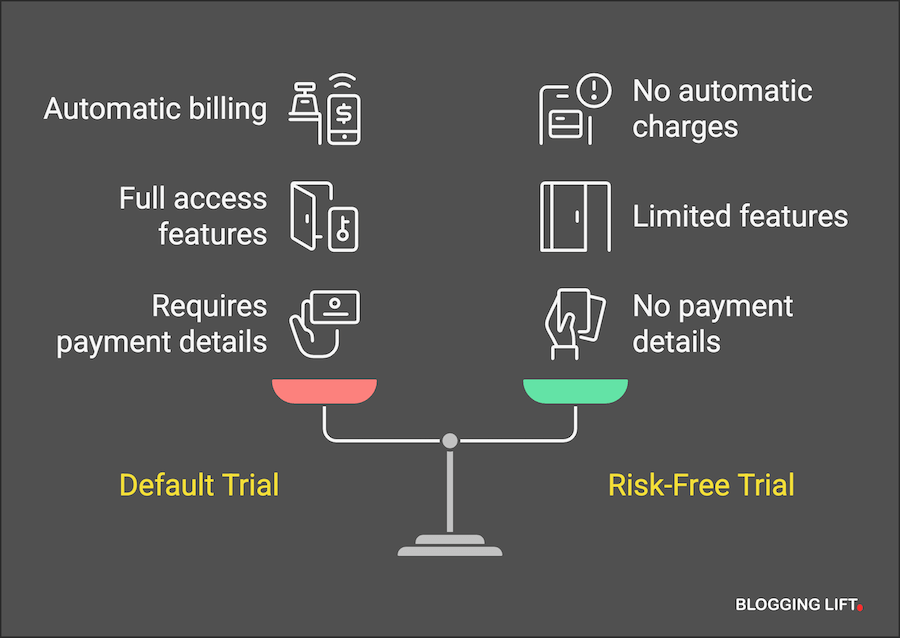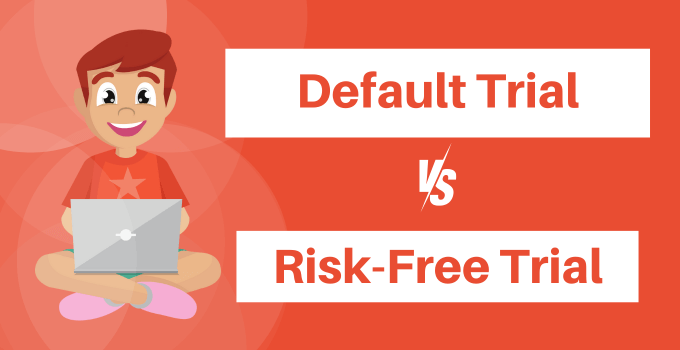Free trials let you test a product or service without committing right away, but not all trials are created equal.
Some ask for payment details upfront, while others let you try without any risk of unexpected charges.
Let’s clear up the differences so you can choose the best option for your needs.

What is a Default Trial?
A Default Trial is a type of free trial where the company requires you to enter your payment details, like a credit card, before activating the trial.
Once you provide this information, the trial period begins, giving you access to the product or service.
The key thing to know about Default Trials is that they often come with automatic billing.
If you don’t cancel before the trial ends, the company will charge your card for the subscription.
Why Choose a Default Trial?
Default Trials may seem risky because they require payment details upfront, but they come with their own advantages.
Here’s why you might want to consider one:
1. Full Access to Features
Default Trials usually give you complete access to the product or service during the trial period.
This allows you to test all the premium features and understand the full value of what you’re considering.
2. Seamless Transition to Paid Plan
No extra steps are required if you decide to continue using the service.
The subscription starts automatically, so you won’t experience any interruptions.
3. Serious Intent
Because payment details are required, Default Trials often attract users who are genuinely interested in the product.
This commitment can help you stay focused on evaluating the service properly.
4. Exclusive Discounts After Trial
Many companies offer special deals or discounted rates during or right after the trial period to encourage you to stay subscribed.
These can help you save if you plan to use the service long-term.
5. Better for Long-Term Evaluation
Since these trials usually offer full access, they are ideal if you’re seriously considering the product and need to test it thoroughly before deciding.
What is a Risk-Free Trial?
A Risk-Free Trial is a type of free trial where no payment details are required to get started.
You can try the product or service without sharing your credit card or worrying about being charged automatically after the trial ends.
Risk-free trials often come with limitations, such as reduced features, fewer credits, or a shorter trial period.
The goal is to let you explore the basic functions of the product and decide if it’s worth upgrading to a paid plan.
Why Choose a Risk-Free Trial?
Risk-Free Trials are a great choice for users who prefer a worry-free experience.
Here’s why you might want to opt for this type of trial:
1. No Payment Details Needed
You don’t have to share your credit card information, which means no chance of accidental charges after the trial ends.
It’s completely stress-free.
2. Safe for Cautious Users
If you’re unsure about committing to a service, a Risk-Free Trial lets you explore it without feeling pressured or worried about forgetting to cancel.
3. Perfect for Casual Testing
Risk-free trials are ideal for people who just want to try out the basic features or see how a product works without diving into advanced tools or options.
4. No Cancellation Hassle
Once the trial ends, your access stops automatically.
There’s no need to remember cancellation deadlines or deal with complicated processes to avoid being charged.
5. Builds Trust and Confidence
Knowing that the company doesn’t require your payment details upfront can make you feel more confident in trying the service.
It shows that the business is willing to let the product speak for itself.
Default Trial vs Risk Free Trial: Which is Better for You?

Deciding between a Default Trial and a Risk-Free Trial comes down to your preferences and how you plan to use the service.
Here’s a side-by-side comparison to help:
| Features | Default Trial | Risk-free Trial |
| Payment Details | Required upfront | Not required |
| Automatic Billing | Charges start after the trial ends unless canceled | No automatic charges |
| Access to Features | Full access to all premium features | Limited features or credits |
| Cancellation Needed? | Yes, you must cancel to avoid charges | No cancellation needed |
| Ideal For | Serious users ready to explore fully | Casual or cautious users |
| Risk Level | Higher, due to possible surprise charges | Low, no payment info required |
| Commitment | Encourages serious use of the product | Allows relaxed exploration |
Also Read: Pros and Cons of Free Trial
Which One Should You Choose?
Go for a Default Trial if:
- You’re seriously considering the product.
- You want full access to all the features.
- You’re confident you’ll remember to cancel on time.
Pick a Risk-Free Trial if:
- You’re just exploring options or trying new tools.
- You don’t want to share payment details upfront.
- You prefer a no-risk, stress-free experience.
FAQs
Can I cancel a Default Trial without being charged?
Yes, you can cancel a Default Trial anytime before the trial period ends to avoid being charged. Just make sure to check the cancellation deadline and follow the steps provided by the company.
Do Risk-Free Trials have no hidden fees?
Yes, Risk-Free Trials don’t require payment details upfront, so you won’t face any hidden fees or surprise charges. However, if you decide to upgrade during the trial, standard charges may apply.
Which trial type is safer for first-time users?
Risk-free trials are safer because they don’t ask for payment details, and you don’t need to worry about forgetting to cancel or unexpected charges.
Why do some companies require payment details for a Default Trial?
Companies use Default Trials to attract serious users who are likely to convert into paying customers. Requiring payment details also ensures a smooth transition to a paid subscription if you decide to continue.
Can I switch between a Default Trial and a Risk-Free Trial?
This depends on the company. Some offer both options, while others stick to one type of trial. If you’re unsure, reach out to their customer support to explore your options.
What happens if I forget to cancel a Default Trial?
If you forget to cancel, you’ll likely be charged for the first billing cycle of the subscription. Contact the company immediately to see if they can issue a refund, but this depends on their refund policy.
Are trials worth it if I don’t plan to subscribe?
Yes! Trials are a great way to test products and services, even if you’re not ready to commit. Just make sure to cancel Default Trials on time to avoid charges.